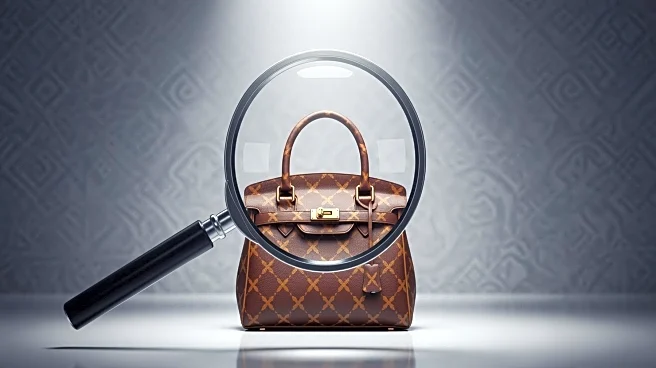What's Happening?
The global market for secondhand luxury items is experiencing significant growth, with authentication becoming a crucial factor for platforms in distinguishing themselves. According to a report by Boston
Consulting Group and Vestiaire Collective, the resale market for fashion and luxury items is expanding at an annual rate of 10%, outpacing the firsthand market. The report projects the global resale market could reach $360 billion by 2030, up from $210 billion today. As counterfeit manufacturing becomes more sophisticated, platforms are investing heavily in verification processes to ensure authenticity. Singapore-based Carousell has opened a physical store for luxury items, offering grading services by appraisers, while South Korea's Bunjang has developed a proprietary authentication system using AI and scientific equipment. These efforts aim to build trust with consumers, who are increasingly wary of 'superfakes'—counterfeits made with materials similar to original brands.
Why It's Important?
The rise in secondhand luxury sales reflects changing consumer preferences, with affordability and access to rare collections driving demand. As the market grows, authentication becomes vital to maintaining consumer trust and platform reputation. Platforms like Carousell and Bunjang are seeing increased business due to their verification processes, which offer buyers confidence in the authenticity of high-value items. This trend highlights a shift in consumer behavior towards sustainable and cost-effective shopping, impacting the luxury goods industry and potentially influencing brand strategies. The emphasis on authentication also underscores the challenges posed by sophisticated counterfeiting, prompting platforms to innovate and adapt continuously.
What's Next?
As the secondhand luxury market continues to expand, platforms are likely to further enhance their authentication technologies and processes. This could involve more advanced AI systems and collaborations with luxury brands to ensure the highest standards of verification. The focus on authenticity may lead to increased consumer confidence and further growth in the resale market. Additionally, platforms might explore new markets and demographics, leveraging the appeal of secondhand luxury to attract a broader audience. The ongoing battle against counterfeiting will remain a priority, with platforms investing in research and development to stay ahead of counterfeiters.
Beyond the Headlines
The emphasis on authentication in the secondhand luxury market raises ethical and legal considerations, particularly regarding intellectual property rights and consumer protection. As platforms enhance their verification processes, they may face challenges in balancing transparency with proprietary technology. The growth of the resale market also reflects broader cultural shifts towards sustainability and conscious consumption, influencing how consumers engage with fashion and luxury goods. This trend could lead to long-term changes in the industry, with brands potentially reevaluating their production and marketing strategies to align with consumer values.









